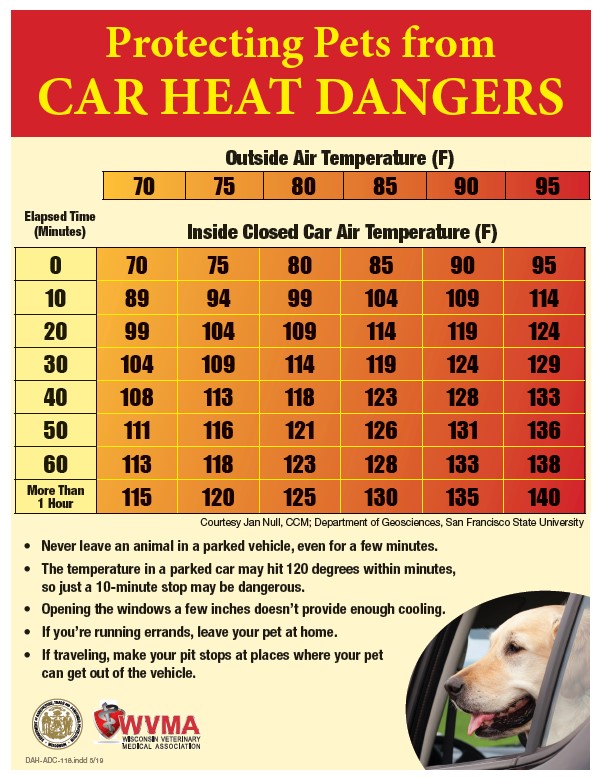Wild animals can make it through the worst weather, but the same can't be said for your cats and dogs. Extreme heat and frigid weather pose all sorts of threats to pets. Food, water, and shelter are the main priorities, but grooming and leashing are also important.
Here are some tips to keep your best friend happy and healthy, regardless of the weather:
Hot Weather
 Heat stroke is a serious threat to animals, and even with prompt treatment it can be fatal. Pets that have already suffered heat stroke once are more susceptible, as are animals that are young or old, have health problems, are overweight, or are snub-nosed.
Heat stroke is a serious threat to animals, and even with prompt treatment it can be fatal. Pets that have already suffered heat stroke once are more susceptible, as are animals that are young or old, have health problems, are overweight, or are snub-nosed.
Signs of heat stroke include panting, staring or stupor, breathing difficulty, an anxious expression, refusal to obey, warm dry skin, fever, rapid heartbeat, vomiting, diarrhea, seizures, and collapse. If you observe any of these signs, call your veterinarian immediately. Get the animal out of direct heat and get it wet in a wading pool, with a hose, or by covering it with towels soaked in cool water. Towels are most effective on less hairy parts of the body, like a dog's belly and legs. Here's how to prevent heat stroke:
- Avoid leaving an animal in a parked vehicle, even for a few minutes. The temperature in a parked car can reach 120 degrees within minutes, so just a 10-minute stop may be dangerous. Opening the windows a few inches doesn't provide adequate cooling. If you're running errands, leave your dog home in a cool basement, or in a shaded yard with a wading pool. If you're traveling, make pit stops at places where your pet can get out of the vehicle.
- Provide fresh, cool drinking water at all times. That includes inside your vehicle when you're traveling.
- Make sure outdoor kennels are shaded and well-ventilated. Use water bowls that will not tip.
- Avoid exercising pets on hot days or warm, humid nights.
- Groom your pet. Clip long coats to about an inch (shorter clips or shaving can leave dogs vulnerable to sunburn). Cats shed profusely in hot weather, so brush them daily to prevent hairballs. Proper grooming also can prevent summer skin problems.
Cold Weather
Provide adequate food. In cold weather, outdoor pets need extra, high-quality food to produce body heat. Indoor pets get less exercise during the cold months, so it's safe to slightly ease off on their food.
Create proper shelter. Outdoor animals need a dry house that's large enough for them to comfortably stand, sit, turn around, and lie down. It should not be so large that the animal's normal body heat is lost. Line the bottom with dry, nonabsorbent material that won't get wet, matted, or frozen. Marsh hay works well; leaves and fabric do not.
Provide fresh water. Make sure your outdoor pets have fresh water daily. Ice or snow will not do, because the animal has to expend too much body heat to melt it. Ideally, you can provide an inexpensive heater that sits in the water bowl to prevent freezing. Otherwise, fill the bowl with fresh, tepid water at least twice a day.
Clean up antifreeze. Leaked or spilled antifreeze (ethylene glycol) is a deadly lure to animals with its sweet taste. Clean it up and, if possible, switch to a less dangerous formulation like propylene glycol.
Use caution when walking. Rub petroleum jelly on your pets' paws before heading out for a walk. It protects them from salt and other de-icers. When you return home, wipe the paws, legs and stomach to remove any de-icers or antifreeze that the animal might ingest. Remove any snow or ice between the paw pads to prevent bleeding. While you're outdoors, keep your dog leashed. Snow and ice can make it difficult for dogs to follow a scent, and they can become lost or run away in panic. Finally, those sweaters and coats some people put on their dogs are not just cute. Short-haired dogs really need them when outdoors in cold weather.
Prioritize grooming. Wet, dirty, matted coats cannot insulate against the cold, so be sure your animals are well-groomed. But never shave a dog's coat during the winter. After bathing an animal, dry it thoroughly before letting it outdoors.
Use care with cars. Cats can crawl under cars and into the engine compartment seeking shelter and warmth. Bang on the hood before starting your car on cold days to startle sleeping animals. And remember, just as cars heat to oven temperature in the summer, they can be equally deadly in the winter when they turn into freezers. Don't leave your pet alone in a vehicle — it could freeze to death.
Provide spaces for sleeping. Even indoor animals needs a warm place to sleep, off the floor and away from drafts. This is especially true for old or ill animals.
Additional Resources